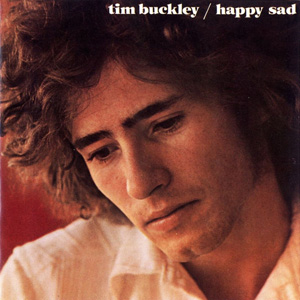- Happy Sad
Infobox Album | Name = Happy Sad
Type =Album
Artist =Tim Buckley

Released = 1969
Recorded = Elektra Sound Recorders, Los Angeles
Genre =Jazz-Rock ,Folk rock ,Psychedelic rock
Length = 44:43
Label =Elektra Records
Producer =Zal Yanovsky ,Jerry Yester
Reviews = *Allmusic Rating|4.5|5 [http://www.allmusic.com/cg/amg.dll?p=amg&sql=10:keb1z83ajyv6 link]
*Piero Scaruffi rating-10|8 [http://www.scaruffi.com/vol1/buckley.html#lorca link]
Last album = "Goodbye and Hello " (1967)
This album = "Happy Sad" (1969)
Next album = "Blue Afternoon " (1970)"Happy Sad" is the third
album bysinger-songwriter Tim Buckley , released in 1969. It was recorded at Electra Sound Recorders inLos Angeles ,California . It marked the beginning of Buckley's experimental period, as it incorporated elements ofjazz that he had never used before. Many of the songs here represent a departure from thebinary form that dominated much of his previous work. The sound of the album is characterized byDavid Friedman 'svibraphone , an instrument which gives the album a more relaxed tone than Buckley's earlier work. The songs are much longer than on previous releases and this style continued through to later works. Thevocals on the album are more drawn out than earlier performances and this represents the beginning of Buckley using his voice like an instrument. Thelyrics on "Happy Sad" represent a change as Buckley stopped working withLarry Beckett , his lyricist on the two previous albums "Tim Buckley" and "Goodbye and Hello ", and began writing the lyrics himself. Buckley's self-penned efforts stand in contrast to Beckett's occasionally political and literary-style work. Underwood, Lee. Retrieved on May 1, 2008 [http://www.timbuckley.com/biography Tim Buckley Biography] "timbuckley.com"] Buckley would also go on to author all his own material on the following two albums.Inspirations and song analysis
"Happy Sad" shares much in common with his later albums, "Lorca" and "
Blue Afternoon ". Much of the material that would appear on those albums was written at the same time as the songs that appear on this album, representing the most productive and prolific period of Buckley' career. Buckley's musical tastes expanded during the period that the album was written and the first track, "Strange Feelin", was directly inspired byMiles Davis ' "All Blues " from "Kind of Blue " and the melody of the song is directly taken from the song. "Buzzin' Fly" was written much earlier than the rest of the work and was originally performed with a group Buckley had during high school, the Harlequin 3, with bassistJim Fielder and later lyricist,Larry Beckett . ,David Browne ]The third track, "Love from Room 109 at the Islander (On Pacific Coast Highway)", is a song composed of various movements and this represents the second time Buckley wrote in this manner, his previous effort being the title track of "
Goodbye and Hello ". The segments of the song were written separately as "Danang" and "Asbury Park", as demonstrated on the later released demo sessions, "". The final version of the song is backed by an 'ocean'sound effect , however this was not originally intended to feature on the song. Buckley and the band were happy with the take of song but due to a recording problem the track had a slight electric buzzing in the background. The producer solved this by muffling the buzzing with the oceanoverdub ."Dream Letter" is as an ode and apology to his ex-wife, Mary Guibert, and his son
Jeff Buckley . This is the second song Buckley wrote about the pair, the first being "I Never Asked to Be Your Mountain" on his previous LP, "Goodbye and Hello ". In comparison to that song "Dream Letter" has a more apologetic tone, the lyrics reveal this with Buckley lamenting "Does he ever ask about me?" . It would be over five years later that Buckley would meet with his son again.Browne, David (October 24, 1993). Retrieved on May 1, 2008" [http://www.jeffbuckley.com/rfuller/buckley/words/features/nyt-unmadestar.html The Unmade Star] ". "The New York Times".] The name of the song would later be used for alive album : posthumous release "". The concert features much of the same personnel from the "Happy Sad"."Gypsy Woman" is a long track highlighting Buckley's vocal acrobatics and on the record has some qualities of a
jam session . Buckley and his band were disappointed with its recording but the song would remain as part of Buckley's live repertoire for the following years. The closer of the album, "Sing a Song For You", is more similar to Buckley's work on "Goodbye and Hello" than to the songs on the rest of the album. It shares the verse/chorus style and folk leanings of "Song to the Siren ", which though released on "Starsailor" was written around the same period.Reception
Released at the height of his popularity, "Happy Sad" was his highest charting album, reaching #81 in the US Pop albums chart, [ cite web |title=Allmusic Chart data: Happy Sad |url=http://allmusic.com/cg/amg.dll?p=amg&sql=10:kifixqq5ldfe~T3 |accessdate=2008-05-15 ] but Buckley's experimentation on this album would alienate some of the fanbase and his mainstream appeal he gained with, 1967 release, "Goodbye and Hello". However, this was only the beginning of Buckley's experimentation with sound and genre and subsequent releases would further reduce his mainstream popularity and see his sales take a downturn.
Track listing
All tracks written by Tim Buckley.
#"Strange Feelin'" – 7:40
#"Buzzin' Fly" – 6:04
#"Love from Room 109 at the Islander (On Pacific Coast Highway)" – 10:49
#"Dream Letter" – 5:12
#"Gypsy Woman" – 12:19
#"Sing a Song for You" – 2:39Personnel
*
Tim Buckley –Guitar , Vocals,12 string guitar
*Lee Underwood – Guitar, Keyboards
*John Miller – Acoustic Bass
*Carter Collins –Congas , Conductor
*David Friedman – Percussion,Marimba ,Vibraphone *
Zal Yanovsky - Producer
*Jerry Yester - Producer
*Jac Holzman - Production Supervisor
*Bruce Botnick - Engineer
*Ed Caraeff - Photography
*William S. Harvey - Art Direction
*Robert L. Heimall - DesignReferences
Further reading
* [http://www.timbuckley.com/biography "Tim Buckley Biography"] by
Lee Underwood
*"",David Browne
Wikimedia Foundation. 2010.
